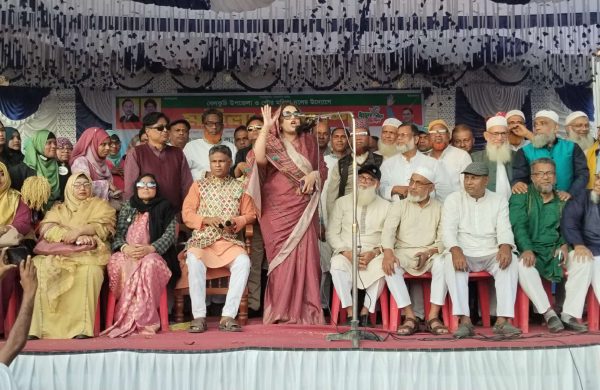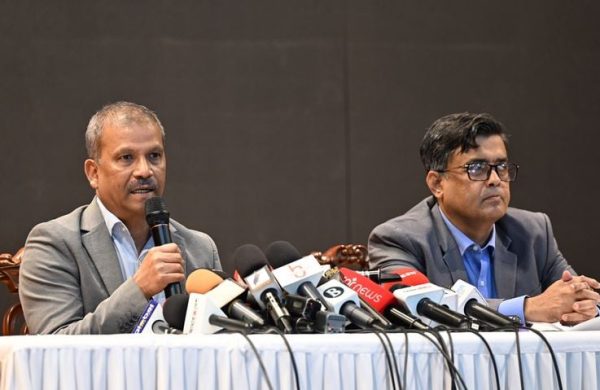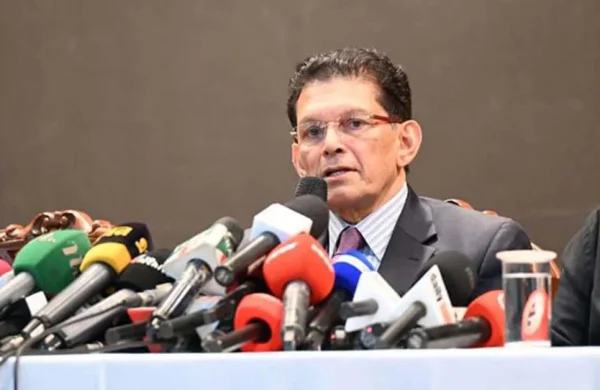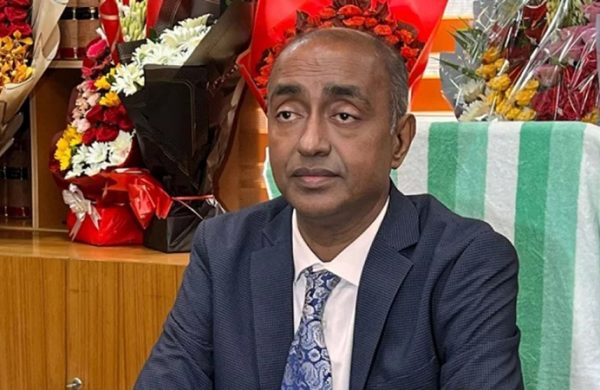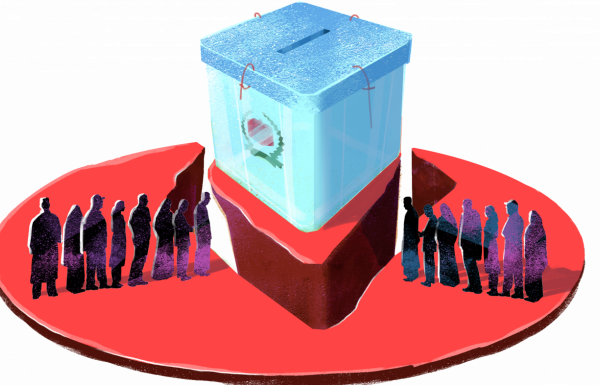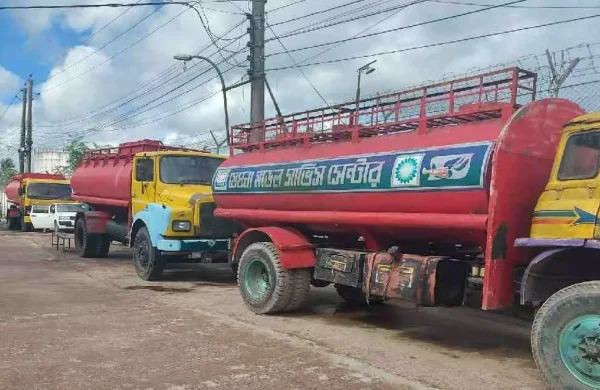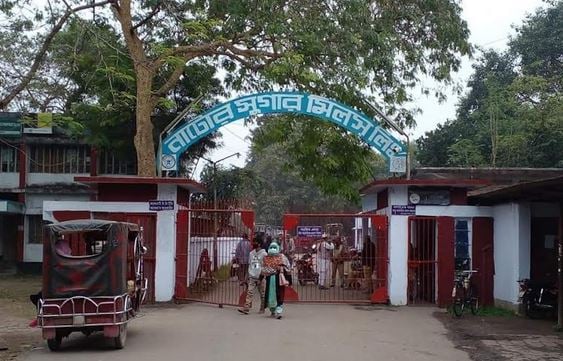Birth registration missing for 41pc of Bangladesh’s under-fives
- Update Time : Thursday, November 20, 2025
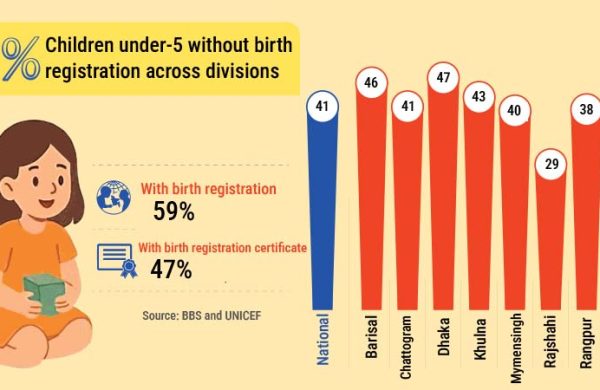
Staff Correspondent:
Forty-one percent of children under five in Bangladesh have not been registered at birth. Additionally, only 47 percent of children in this age group have received their birth certificates. An analysis of the latest joint survey by the Bangladesh Bureau of Statistics (BBS) and UNICEF shows that the national birth registration rate for children under five is now 59 percent, up from 56 percent in 2019. Although the rate has improved, officials say it remains far below the goal of universal registration. The government, however, has a commitment to ensuring 100 percent birth and death registration by 2030 under the Sustainable Development Goals (SDG).
More than half of all children in the country are not registered immediately after birth. Registration rates are lower among newborns and very young children. Only 43 percent of children aged between 0 and 11 months are registered. The rate rises to 55 percent for ages 12 to 23 months and to 63 percent for ages 24 to 35 months. And for children between 36 and 47 months, the rate reaches 65 percent.
Officials say a lack of coordination between the health system and registrar offices is delaying birth registration. Even children born in health facilities and hospitals often go unregistered. Hospitals in Bangladesh cannot register births and deaths, so families must visit a separate office to finish the process. Experts point out that many countries in the Asia-Pacific region have nearly universal registration because hospital authorities handle all births and deaths that occur in their facilities.
Notably, not all registered children have birth certificates. At the national level, only 47 percent of registered children under five have a birth certificate. This means one in every two children in this group does not have the document.
Divisional data show that Rajshahi has the highest registration rate for children under five at 71 percent, followed by Sylhet at 64 percent. Dhaka has the lowest rate at 53 percent. The rates are 54 percent in Barisal, 59 percent in Chattogram, 57 percent in Khulna, 60 percent in Mymensingh, and 62 percent in Rangpur.
A mother’s education level and socioeconomic status influence registration rates. Children of mothers with secondary education or higher are more likely to be registered.
The survey shows that nearly 90 percent of parents know how to complete a birth registration. Yet they still run into major obstacles at union councils, including inconsistent service, unexpected costs, and the pressures of poverty. Most children are born in health centers. But as registration is not done at the time of delivery, families lose the chance to obtain a certificate immediately.
Asked about complaints that parents do not receive proper support at union councils, Golam Mostofa, chairman of the No. 6 Upadi South Union Council in Matlab South, Chandpur, told journalists that parents do not face obstacles or harassment at his office. “Most parents come in directly and complete their child’s registration, and some work through local union members,” he said. “If the server is running and there is no technical issue, registration can be completed very easily.”
Data from the Office of the Registrar General for Birth and Death Registration shows that an average of 40,000 to 50,000 birth registrations are completed every day. Correction requests are being processed as well. Even so, registering the births of children from floating or homeless families remains one of the biggest challenges. In theory, registration should be possible with either the birthplace or the current address, but many such children remain excluded from the system.
Abdur Rob, an official at Shishu Polli Plus, an NGO working on child rights, told journalists the relevance of the document, poverty, registration fees, mobility, and lack of an interlinked system between health facilities and registry offices mean that progress is slow. And so, many undocumented children within cities end up with no permanent address or important papers in their name, and therefore, are left out of many state services. clunky paperwork. Moreover, even if families understand that birth registration still has not taken root in the country’s social practices, despite being essential. He said front-line workers often lack commitment. He attributed the low registration rate in major cities such as Dhaka to uneven urban development. Among the obstacles, he added, there are economic impediments as well as geography, and then
When asked why Dhaka Division has the lowest birth registration rate, Akter Unnesa Shiuli, executive officer of Region 10 of the Dhaka South City Corporation (DSCC), told journalists, “Most people living in Dhaka are temporary residents (tenants) who have come from other districts. One rule of birth registration is that it must be done at a permanent address. Since most people in villages or at the district and upazila levels are local residents, the registration rate there is higher.” She added that fewer women come to the offices for services because they do not want to step outside their comfort zones, though she said the offices welcome both women and men.
Md Zahid Hossain, the registrar general (Birth and Death) at the Local Government Division (LGD) and an additional secretary, told journalists, “The birth registration rate in Dhaka is low because there are fewer permanent residents here.” Speaking about the difficulties and gaps in registering children from floating or marginalized families, he said, “There are some statutory rules for birth registration. Those rules are being followed. However, in the case of the floating population, as long as their place of birth or current address is available, they can be registered.”
The registrar general said they are working with local government institutions and various volunteer development organizations to register the city’s floating population. He said training has been arranged for workers, and that the Dhaka North and South City Corporations carry out the main responsibility for this registration.
He added, “All children who officially start school have birth registration because they cannot begin their education without it.”


